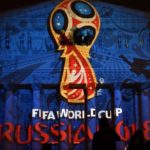Britain’s retaliation against Russia in their spy-poisoning brawl includes a small but symbolic slap: No ministers or members of the royal family will attend the World Cup this summer.
The announcement, part of Prime Minister Theresa May’s list of measures announced Wednesday to penalize the Russians, comes three months before England’s team will play in the tournament hosted by Russia, which starts June 14 and lasts through July 15.
She did not call for Britons to boycott the World Cup, one of the most popular global sporting events. Prince William is the president of the English Football Association, the governing body that oversees the country’s national team.
Russia has denied accusations that it was responsible for an attack using a Russian-made, military-strength nerve agent against a former Russian spy, Sergei V. Skripal, and his daughter in Salisbury, England, on March 4.
The absence of British ministers or members of the royal family at the World Cup, May said, was meant to reinforce the message to Russia that “in the aftermath of this appalling act against our country, this relationship cannot be the same.”
Tensions between Russia and Britain over the poisoning, which had been building well before May’s announcement, had raised worries about the safety of British soccer fans who wish to attend World Cup matches.
In a statement reported by British sports news outlets, the English Football Association said it would “continue to work closely with the UK Government and relevant authorities regarding our participation.”
“Our priority for all England matches is to ensure the safety and security of the fans, players and staff,” the statement said. “As is standard practice, we will take all travel guidance from the Foreign and Commonwealth Office.”
In an updated travel advisory posted Wednesday on its website, the Foreign Office said that “due to heightened political tensions between the UK and Russia, you should be aware of the possibility of anti-British sentiment or harassment at this time.”
The advisory urged Britons in Russia to “remain vigilant, avoid any protests or demonstrations and avoid commenting publicly on political developments.”
The reaction among Russian sports and political figures to May’s announcement was muted or dismissive.
“It’s not so important,” Nikita Simonyan, a vice president of the Russian Soccer Union, was quoted by the Interfax news agency as saying. “That’s their problem. It is important that the team comes, and the team wants to come.”
Urging Britain not to mix sports and politics, Simonyan was also quoted as saying that if ministers and members of the royal family “change their minds, we are ready to host them.”
Svetlana Zhurova, the deputy head of the international affairs committee of the Russian Parliament, was quoted by Interfax as saying that the British government’s reaction could have been far more severe.
“You could say the British politicians were rather humane concerning athletes and fans,” she was quoted as saying. “Fans don’t really worry about the presence or absence of official figures in the stands.”
Source: Pulse.ng



